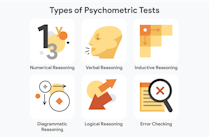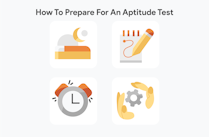Psychometric Tests: A Complete Definition With Examples (2026)
All products and services featured are independently selected by WikiJob. When you register or purchase through links on this page, we may earn a commission.
- A List Psychometric Tests Available for Practice in 2026
- What Are Psychometric Tests?
- A Brief History of Psychometric Tests
- Why and When Are Psychometric Tests Used?
- What Do Psychometric Tests Measure?
- What Are the Different Types of Psychometric Test?
empty
empty
empty
- How to Prepare for (and Pass) Psychometric Tests in 2026
- Take 6 Free Psychometric Test Right Now!
- Practice Test 1: Numerical Reasoning
- Practice Test 2: Verbal Reasoning
- Practice Test 3: Diagrammatic Reasoning
- Practice Test 4: Watson Glaser
- Practice Test 5: Inductive Reasoning
- Practice Test 6: Situational Judgement
- Frequently Asked Questions

A List Psychometric Tests Available for Practice in 2026
- Numerical Reasoning
- Verbal Reasoning
- Diagrammatic Reasoning
- Watson Glaser
- Inductive Reasoning
- Situational Judgement
What Are Psychometric Tests?
Psychometric tests are often used as part of a recruitment process.
They are a way for employers to assess your intelligence, skills and personality.
In other words, recruiters use psychometric test scores to work out whether or not to hire you.
These tests also evaluate your capacity to work with others, process information and cope with stress.
The majority of psychometric tests are taken online, although paper tests are sometimes used.
A Brief History of Psychometric Tests
Psychometric tests are by no means a new concept; they have been used since the early 20th century, when they were originally used only for the purposes of educational psychology.
It was in 1905 that Alfred Binet introduced the first 'intelligence test'.
They have since evolved to become a common feature of a selection process.
Particularly within large, competitive organisations, these types of test are frequently used as they can assess candidates based on their acquired skills rather than educational background.
Why and When Are Psychometric Tests Used?
Recruiters like to use psychometric tests for the following reasons:
- They are objective and impersonal, allowing candidates to be compared in ability terms without unconscious bias.
- They help to make the recruitment process more efficient and can represent substantial HR costs.
- They are proven to be reliable indicators of future job performance.
The tests may appear at any stage in the recruitment process but usually, you will undertake the test at one of these three stages:
- Immediately after you submit your application form
- As an add-on to your interview
- Immediately before or after your actual interview
What Do Psychometric Tests Measure?
The term 'psychometric' is coined from the Greek words for mental and measurement.
There are three main areas that the tests explore:
- Your capabilities
- Your aptitude for the job
- To determine whether your personality fits in with the vision of the organisation you are hoping to join
Essentially, the tests are looking to evaluate your intelligence, aptitude and personality, as well as how you handle pressure and your working style.
What Are the Different Types of Psychometric Test?
As explained further below, there are essentially three categories: aptitude tests, skills tests and personality tests.
Let's examine each in turn:
Aptitude Tests
Aptitude tests aim to assess a specific or general set of skills, though this often depends on the type of job that you are applying for.
Categories found within this group include:
-
Numerical reasoning test. Used to identify how you interpret data, often via a combination of written and statistical information presented in reports, graphs or charts. This can also be used to assess basic mathematical abilities. Try a free sample test below.
-
Verbal reasoning test. Used as a way to determine your ability to evaluate detailed written information so as to make an informed decision. Try a free sample test below.
-
Inductive reasoning test. These require you to identify trends or patterns, typically using diagrammatic information. Try a free sample test below.
-
Diagrammatic reasoning test. These assess your capacity for logical reasoning, using flowcharts and diagrams. Try a free sample test below.
-
Logical reasoning test. Aims to evaluate your skills in reaching a conclusion. You may be provided with some information and then asked to make a decision on what you have been provided with. As such, these tests are also often known as deductive reasoning tests.
-
Error checking test. Assesses your ability to quickly identify any errors in complex data sets such as codes, or combinations of alpha-numeric characters.
Prepare for Any Job Assessment Test with JobTestPrep
The type of test that you will have to undertake will be determined by the job type and sector.
For example, inductive or logical reasoning assessments are used to evaluate candidates applying for jobs in science, IT or other roles where advanced technical skills may be needed.
These tests usually comprise of multiple-choice questions and a specified time frame in which to complete them.
Inductive testing can result in the identification of new solutions and strategies to solve the issue, which is why these types of tests are used in many firms who specialise in technological innovation.
As with any type of recruitment related test, it is always recommended that you familiarise yourself with the process so that you know what to expect and are adequately prepared.
Psychometric tests are quite formal and impersonal but there are many ways in which you can practice and prepare.
As well as our own aptitude tests, WikiJob recommends the psychometric tests available from JobTestPrep.
WikiJob also has a psychometric tests app, available for both Android and Apple devices, which includes 10 numerical tests and 8 verbal tests. The tests include a timer and worked solutions at the end.
Skills Tests
Skills tests represent a way for employers to evaluate how quickly you can learn a new skill to competently carry out the job you are applying for.
Depending on the job you are hoping to secure, the aptitude test may include something such as designing a basic web page (if you are applying to be a designer) or a financial modelling task (if you are applying for a quantitative role in finance).
Both capability and skills tests are assessed through paper-based exercises consisting of multiple-choice questions completed under exam conditions.
Increasingly, psychometric tests are completed online using specialist systems that removes the requirement for a paper-based test.
Personality Tests
Personality assessments enable employers to evaluate your suitability based on your behaviour and the way in which you approach your work.
This will be used to determine how well you will fit into the organisation and the culture of the business.
Your responses will often be cross-referenced with those of a top-performing employee or successful manager, which will be an indication as to whether you share the same characteristics.
Employers look at many factors during the recruitment process, from your knowledge and experience through to your aptitude in areas such as decision making and teamwork.
Increasingly, they will use personality tests as a way to determine if you have the right attitude and personality to fit in with the company’s culture and vision.
Myers Briggs is one of the most commonly used personality tests.
After progressing through a series of questions about how you would feel or act in a given scenario, you will be assigned to one of sixteen personality types based on your responses.
Employers then review this personality type to see if you would fit in with their organisational values.
There is rarely a time limit, as they are looking for you to answer the questions honestly (though it's worth having a sense of the job description and the employer needs in the back of your head as you go along).

If you need to prepare for a number of different employment tests and want to outsmart the competition, choose a Premium Membership from JobTestPrep.
You will get access to three PrepPacks of your choice, from a database that covers all the major test providers and employers and tailored profession packs.
Prepare for Any Job Assessment Test with JobTestPrep
How to Prepare for (and Pass) Psychometric Tests in 2026
Practising similar aptitude tests beforehand is likely to improve your performance in the real tests.
As such, try to become more familiar with the types of test you may face by completing practice questions.
Even basic word and number puzzles may help you become familiar with the comprehension and arithmetic aspects of some tests.
WikiJob recommends practising aptitude tests prior to the real assessment.
JobTestPrep offers a wide range of professionally constructed psychometric questions, structured in a professional format, just like the real thing.
Step 1. Preparation Before the Test
Treat aptitude tests like an interview: get plenty of rest and sleep, plan your journey to the test site, and arrive on time and appropriately dressed.
Listen to (or read) the instructions you are given and follow them precisely.
Before the actual aptitude test itself, you will almost certainly be given practice examples to try.
Make sure you ask questions if anything is unclear at this stage.
You will normally be given some paper on which to make rough workings.
Often you can be asked to hand these in with the test, but typically they do not form part of the assessment.
Step 2. Taking the Test
You should work quickly and accurately through the test.
Don’t get stuck on any particular question: should you have any problems, return to it at the end of the test.
You should divide your time per question as accurately as you can – typically this will be between 50 and 90 seconds per question.
Remember that the tests are difficult and often you will not be expected to answer all the questions.
Be particularly cautious if the aptitude test uses negative marking; if this is not the case, answer as many questions as possible in the time given.
Remember that multiple-choice options are often designed to mislead you, with incorrect choices including common mistakes that candidates make.
When approaching any type of psychometric test, it is really important that you do not try and give answers that you think the employer will want to read, as they can usually see when candidates try to do this.
If you are the right match for the business, you should find the tests relatively straightforward.
Watch JobTestPrep's video on why you should prepare for a psychometric test.
Prepare for Any Job Assessment Test with JobTestPrep
Take 6 Free Psychometric Test Right Now!
If you would like to practise simulation aptitude tests, please try the 6 ones below, which were created by WikiJob and JobTestPrep in association with psychometric experts, and which are closely modelled on real tests.
The numerical, Watson Glaser and inductive tests consists of 10 questions to be answered in 10 minutes, while the diagrammatic, situational judgement and verbal tests consist of 5/10 questions to be answered in 5 minutes (although there is no timer on the test itself).
Our tests are slightly harder than the real thing, in order to make them sufficiently challenging practice.
Don't forget to first check out the test tips and techniques mentioned further down this page.
You can take the tests as many times as you like. Click the 'Take Test' link below on either to get started.
Practice Test 1: Numerical Reasoning
Try this numerical reasoning practice test similar to SHL, PSL and the GTIOS psychometric tests used by many companies as part of their application process.
| Questions | 10 |
| Pass Percentage | 80% |
| Time Limit | 7 min |
Prepare for Any Job Assessment Test with JobTestPrep
Practice Test 2: Verbal Reasoning
Verbal reasoning tests are used by interviewers to find out how well a candidate can assess verbal logic. SHL is perhaps the most well-known producer of verbal reasoning tests, and the most widely used.
| Questions | 10 |
| Pass Percentage | 80% |
| Time Limit | 5 min |
Prepare for Any Job Assessment Test with JobTestPrep
Practice Test 3: Diagrammatic Reasoning
Diagrammatic reasoning tests assess your capacity for logical reasoning, using flowcharts and diagrams. Try these five practice questions, designed to be similar to those used by major graduate employers.
| Questions | 5 |
| Pass Percentage | 80% |
| Time Limit | 5 min |
Prepare for Any Job Assessment Test with JobTestPrep
Practice Test 4: Watson Glaser
A Watson Glaser test is designed to assess your ability to digest and understand situations and information; it is frequently used by law firms. Try these 10 questions as an introduction.
| Questions | 15 |
| Pass Percentage | 80% |
| Time Limit | 25 min |
Prepare for Any Job Assessment Test with JobTestPrep
Practice Test 5: Inductive Reasoning
Try this inductive reasoning test, designed to find your ability to see patterns and consistencies in data, and to work flexibly with unfamiliar information.
| Questions | 15 |
| Pass Percentage | 80% |
| Time Limit | 15 min |
Prepare for Any Job Assessment Test with JobTestPrep
Practice Test 6: Situational Judgement
Situational Judgement tests assess your ability at solving problems in work-related situations. Try these five practice questions, designed to be similar to those used by major graduate employers.
| Questions | 10 |
| Pass Percentage | 70% |
| Time Limit | 10 min |
Prepare for Any Job Assessment Test with JobTestPrep
How should you prepare for a psychometric test? Watch this video from JobTestPrep for some insights.
Above all, be yourself, take your time and answer the questions honestly. Approach the tests logically and try to prepare as much as you can before you take them.
As well as our own aptitude tests, WikiJob recommends the practice tests available from JobTestPrep.
Prepare for Any Job Assessment Test with JobTestPrep
A psychometric test is an assessment of the inherent skills, abilities and competencies of the test-taker.
Most often used in pre-employment screening to narrow down a large talent pool, psychometric tests are not about particular skills or what you have learned through formal education.
The right psychometric tests use occupational psychology and are based in science. Companies use them to predict future performance and demonstrate the learnability of the candidate.
Psychometric tests include assessments that look at verbal, numerical and logical ability, as well as personality and work behavior. The most popular psychometric tests are:
The best psychometric tests depend on the types of roles, and some are more suitable than others.
For a financial role, you are likely to face numerical reasoning assessments, while for a leadership role you might expect to take situational judgment tests.
The most well-used tests include:
These tests are about inherent ability and competency in critical thinking and dealing with data in various forms.
Other tests that are used as part of a psychometric battery for recruitment look at work behavior, personality traits, and how you make decisions.
These include:
Psychometric tests are designed to be challenging as they are used to narrow down talent pools in the recruitment process.
To give yourself the best chance of success, there are a few things that you can do.
Firstly, know who publishes the test(s) that you will be facing. Practicing tests is the best way to prepare, and if you practice tests based on the right publisher you will become more familiar with the layout and the time limits, as well as the content of the questions you can expect.
Practice tests will highlight the areas where you might need to refresh your knowledge. Focusing revision on the areas you need more help on – whether that is working with percentages or evaluating arguments – will make it easier for you on the day.
As you approach the test day, make sure that you have had enough sleep, and you eat a healthy meal while staying hydrated. This will help ensure that your brain can work at full capacity.
When it comes to taking the test, make sure you read the questions thoroughly, and take your time when answering. Most psychometric tests are timed, but you shouldn’t rush through in case you miss an easy answer or misread what the question is asking of you.
The most common way that the biggest companies use psychometric tests is during recruitment, as pre-employment screening.
Major test publishers base their psychometric tests in science, particularly organizational psychology, and ask the right questions to assess a potential employee on their aptitude and skills.
This is not only a benchmark for their current abilities but also a predictor for future success too.
Psychometric testing is also used in the development of current employees in businesses. The tests can identify training needs for promotions and look for leadership potential.
A psychometric test is based on your inherent knowledge, rather than things you have learned in school. This means that education is not really going to help you when it comes to succeeding in the psychometric tests – but there are some things that you can do.
Practicing tests is one of the first steps – this will help you to feel more familiar with the structure and layout of the assessments, especially if you use practice tests created by the publisher that is used by the company.
You can brush up on specific skills (like maths, for example) based on the results of these practice tests so that you are confident with all of the sections you will be facing.
Before you take the test, make sure that you have had a good night’s sleep so that you are as well-rested as you can be. You need to feed your brain too – a healthy meal and good hydration are important.
During the test, remember that you are being timed – this is important, but don’t let it make you rush through. Take your time to read the questions and any other information that you have been given so that you don’t miss an answer you know or misread a question and answer wrongly.
Preparation is key to reliable performance in a psychometric test. You can practice relevant tests that are created by the same publisher so that you get familiar with the structure and layout.
You can use this practice to highlight the areas where you need revision and create a study plan.
Other things you can do to prepare for a psychometric test include getting a good night’s sleep, eating healthily and staying hydrated – giving your brain the tools it needs to succeed.
Each publisher is different, and each employer that uses psychometric tests will have a different benchmark to measure success in the assessment.
Most psychometric tests are not negatively marked, so to get a good score you must answer as many questions – correctly – as you can.
Usually, the results of psychometric tests are presented as a percentile, where your results will be measured against other test-takers. The recruiters will pick the top performers to take further into the recruitment process.
In practice, this means that you need to perform at your best because you are in competition with the other applicants.
It is possible to fail a psychometric test if you do not achieve the required score set by the employer.
The psychometric tests used by the major employers are designed to assess whether you are a good fit for the role – whether you will be successful based on your inherent skills and abilities.
Failing the tests means that according to the recruitment team, your competencies do not match their requirements, which is important for you too.
Being in a role you are not suitable for can be problematic in the long run, as you might struggle to keep up with the workload or learn the role. You might not be happy in the work culture as it might not suit your personality traits, and this means that you are less likely to remain in position and be a successful employee.
In some cases, if you fail the psychometric tests, you might be able to retake them in a new application.
The first place that you should look when getting ready for a psychometric test is the publisher's website.
You will usually know ahead of time which publisher has created the psychometric test that you will be facing as part of the recruitment process, and there are usually practice tests available on the publisher’s website.
This is also a good place to get more information about the tests, as many have a candidate hub full of useful information and tips.
Aggregate websites like Wikijob have the lowdown on different test types, with ample free practice tests and example questions included that can give you all the details you need to pass with flying colors.
You can find practice tests on JobTestPrep too, based on either the type of test that you are facing or the specific publisher. There are also useful Prep Packs that include lots of practice tests, revision tips and resources.
There are several places online where you can practice psychometric tests for free.
One of the best sources that you can use is the publisher's website itself. When you know the publisher of the tests you will be facing, you can go directly to the website and find their practice tests so that you can complete them.
With sites like JobTestPrep, you can find example questions and practice tests for free, alongside tips and tricks to help you perform at your best.
There are also paid-for Prep Packs that are designed to give you everything you need, including extra tests and revision resources.
The more you practice, the more comfortable and familiar you will be with the structure and layout of the psychometric tests. This will make you less nervous when it comes to completing the real test and help you get a better score.
Some of the top psychometric test providers include:
These publishers offer a range of psychometric testing options, from numerical and verbal reasoning tests to assessments of logical and critical thinking, work behavior and personality traits.
Taking a psychometric test as a candidate for a job role has no cost for the potential employee.
If you decide to purchase prep packs to help you get the best score, this can have a cost, but there are free practice resources available online.
The cost to the business using the test depends on the publisher and the type of test.
Some publishers offer ‘off-the-shelf’ generic test options that can be used for a range of application types. Bigger businesses can take advantage of bespoke test packages designed to test for specific aptitudes suitable for the roles needed.
Test packages can be costly to businesses, but they are used to reduce the cost per hire in the recruitment process by reducing large talent pools, taking the time of the recruitment team away from screening, and focusing hiring expenses on the most qualified candidates that are more likely to be successful and remain in position.
It is possible to cheat on a psychometric test, and, understandably, candidates might consider it – after all, these challenging assessments are part of the recruitment process for several top jobs.
If you are applying for a role where psychometric testing is part of the pre-employment screening process, you know that if you fail you will not be taken further and will lose the opportunity to get that job.
Some of the ways that a candidate could cheat include getting someone else to take the test. Sometimes candidates ask a friend to complete it on their behalf, logging in to the online platform as the candidate and getting a good score.
There are even online sources where you can pay someone to take the psychometric test on your behalf, apparently guaranteeing you a good score.
With remote testing, this is something that the businesses are aware of happening. Sometimes test publishers offer remote proctoring for these assessments, which can be used to recognize dishonest behavior (like an extra face in front of the computer, or a copy and paste attempt for example).
Other companies might ask successful candidates to retake the assessment in person during later stages of the recruitment process.
Cheating in a psychometric test is not a good idea, even if you really want the job. Not only will dishonest behavior mean that your application will be rejected, but if you don’t meet the requirements of the role, you are likely to be unhappy if you get the job, struggle with the workload, or feel like you don’t fit in the workplace culture – which is not an effective way to start a career.
While it might seem like a promising idea to give the answers you think an employer wants to see in a psychometric test, you should not fake it.
The test battery is designed based on organizational psychology, and you need to answer all questions to the best of your ability and personal knowledge.
This is especially true of situational judgment and personality assessments, where it can be obvious if you are answering in a way that is not completely honest.
With the aptitude tests (verbal, numerical and logical reasoning in particular), you need to answer as best you can because they care about your inherent abilities.






